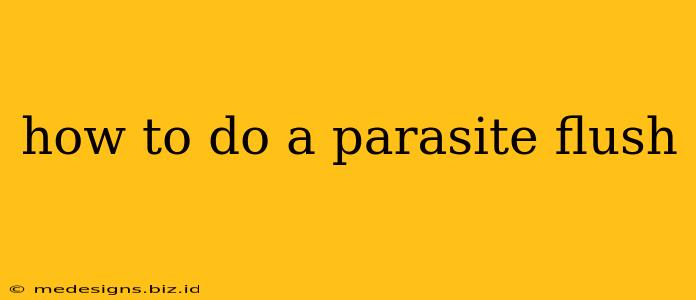Are you experiencing unexplained digestive issues, fatigue, or skin problems? You might be wondering if a parasite flush could help. While there's limited scientific evidence supporting the widespread effectiveness of parasite flushes for everyone, many people believe they can help cleanse the body of intestinal parasites. This guide will explore the process, potential benefits, risks, and crucial considerations before attempting a parasite flush. It is crucial to consult your doctor before starting any parasite cleanse, as self-treating can be dangerous.
Understanding Parasite Flushes
A parasite flush, also known as a parasite cleanse, is a holistic approach aimed at eliminating parasites from the digestive system. It typically involves a combination of dietary changes, herbal remedies, and sometimes specific supplements. The goal is to create an environment inhospitable to parasites while supporting the body's natural detoxification processes. Important note: This is not a replacement for medical diagnosis and treatment.
What are Parasites?
Parasites are organisms that live on or in a host and benefit at the host's expense. Intestinal parasites, such as worms, amoebas, and protozoa, can cause a range of symptoms, including:
- Digestive issues: Diarrhea, constipation, bloating, abdominal pain
- Fatigue and weakness: Loss of energy, lethargy
- Skin problems: Rashes, itching, hives
- Weight loss: Unexplained weight decrease
- Nutrient deficiencies: Malabsorption of vital nutrients
Types of Parasite Flushes
There isn't a single "one-size-fits-all" parasite flush. Methods vary, but common approaches include:
Herbal Remedies:
Many herbs are traditionally used to support parasite elimination. These may include:
- Wormwood: Known for its potential antiparasitic properties.
- Black walnut: Often used as a natural anthelmintic (anti-worm).
- Cloves: Contain compounds believed to have antiparasitic effects.
- Pau d'Arco: A South American tree with traditional use in parasite cleansing.
Disclaimer: The effectiveness of these herbs varies, and it's essential to use them cautiously and under professional guidance.
Dietary Changes:
A crucial aspect of a successful parasite flush is a supportive diet. Focus on:
- Increased fiber intake: To promote regular bowel movements and help eliminate parasites.
- Foods rich in antioxidants: To support the body's detoxification processes.
- Hydration: Drinking plenty of water is vital for flushing toxins.
- Avoiding processed foods, sugar, and alcohol: These can hinder the body's ability to cleanse effectively.
Potential Benefits & Risks
While anecdotal evidence suggests benefits, more robust scientific research is needed. Potential benefits may include improved digestion, increased energy levels, and clearer skin. However, risks exist:
- Herbal interactions: Herbs can interact negatively with medications.
- Allergic reactions: Some herbs may trigger allergies.
- Digestive upset: Cleanses can cause nausea, diarrhea, and vomiting.
- Nutrient deficiencies: Some cleanses can deplete essential nutrients.
When to See a Doctor
Seeking professional medical advice is crucial before, during, and after a parasite flush. Symptoms suggesting a parasitic infection warrant immediate medical attention. Do not self-diagnose or self-treat. A doctor can diagnose the specific parasite, recommend appropriate treatment, and monitor your progress.
Conclusion
A parasite flush can be part of a holistic approach to supporting gut health, but it should never replace conventional medical treatment. Always consult a healthcare professional before attempting a parasite flush, especially if you have underlying health conditions or are taking medications. Remember, a healthy diet, regular exercise, and stress management are fundamental aspects of overall well-being and parasite prevention.
